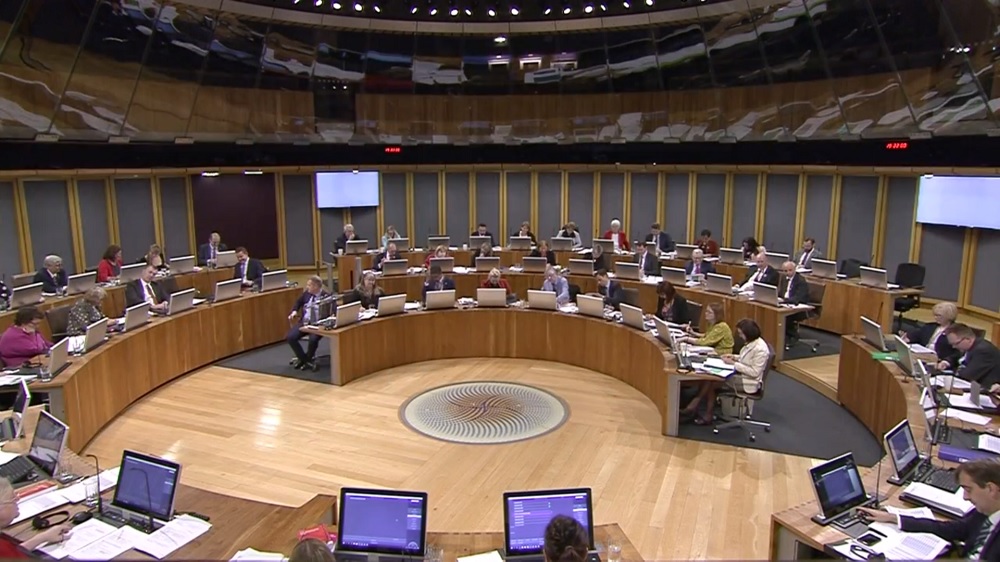Today’s Senedd roundup: First Minister defends deputy campaigning against her own government

Owen Donovan, Senedd Home
First Minister’s Questions.
Following the news that Deputy Minister and Chief Whip, Jane Hutt (Lab, Vale of Glamorgan), had campaigned against the closure of a ward at Barry Hospital, Adam Price AM (Plaid, Carms. E. & Dinefwr) asked whether the First Minister would sack her?
With the Welsh Government at risk of “turning double standards into an art form” it was a simple matter of accountability and the principle of collective cabinet responsibility:
“Now, I completely understand why Labour backbencher members want to campaign against health closures under your Government, but surely the position of Ministers is different. Accountability for the health service must lie with Ministers collectively in the Welsh Government, otherwise what is the point of the Welsh Government?”
– Adam Price AM
The First Minister dismissed Adam Price’s interpretation as “nonsense”. It was quite clear there had been no ministerial code breach:
“Here is paragraph 4.7 in the ministerial code: ‘Ministers are free to make their views about constituency matters known’…..What (Jane Hutt) did is entirely consistent with the ministerial code…(she) has a better understanding in her little finger of the probity and decency required of ministers than his question this afternoon demonstrates for a moment.”
– First Minister, Mark Drakeford (Lab, Cardiff West)
Domestic violence victims face postcode lottery seeking support
Leader of the Opposition, Paul Davies AM (Con, Preseli Pembs.), raised a “postcode lottery” in support for domestic violence victims found by the Wales Audit Office last year. The Welsh Government is yet to formally respond to that report. He was willing to support the government on this, but it was time to get a move on to address weaknesses.
“I’m concerned about the continuing delays associated with the 2015 (Domestic Violence) Act, because your government has now taken more than four years to lay national indicators following that Act, and we on this side of the Chamber want to work with you to ensure that the national indicators and the objectives of the national advisers on domestic abuse are appropriate. I am concerned that the objectives don’t appear to focus on a major area of helping to increase victim confidence and access to justice, especially as four out of five women do not report abuse to the police.”
– Leader of the Opposition, Paul Davies AM
The First Minister said all local domestic violence strategies were under review and it’s been reported that there’s been “real momentum” since the auditor’s report was published. Extra funding has been provided towards domestic violence services in the 2020-21 budget.
Questions after Storm Ciara flooding
Before FMQs, Janet Finch-Saunders AM (Con, Aberconwy) had asked about the Welsh Government’s response to Storm Ciara, which resulted in major flooding in the Conwy valley – with Llanrwst particularly hard-hit.
Serious flooding is becoming a regular occurrence in the valley and the AM questioned the speed Natural Resources Wales flood warnings were issued and also called for an independent review of flood defences in the valley.
Llyr Gruffydd AM (Plaid, North Wales) added that the narrative that flood defences were too expensive had to change when ultimately they’re designed to save money by avoiding costly outcomes.
Environment, Energy & Rural Affairs Minister, Lesley Griffiths (Lab, Wrexham), said Conwy Council and NRW will need to take a look at the causes and bring forward appropriate recommendations for work. £350 million is being invested in flood defences this term.
While she was pleased the Flood Re insurance scheme means 90% of insurance companies cover flood-prone homes, due to financial services being the responsibility of the UK Government, businesses aren’t covered by that scheme and she promised to take that up with Whitehall.

Private tenants set to be given a longer notice period for “no-fault” evictions
Renting Homes (Amendment) Bill
Introduced by Local Government & Housing Minister, Julie James (Lab, Swansea West)
Bill (pdf)
Explanatory Memorandum (pdf)
Why is the Bill needed?
The proportion of homes in Wales which are privately rented has increased from 9% in 2007 to 15% in 2019, with changing demographics of private renters happening alongside it – more families, more older people. As a result, there’s a need to provide greater security in tenancies.
While the Renting Homes Act 2016 provides some of this security – such as increased protections from certain types of eviction/possession order – parts of it haven’t yet been fully implemented. This allowed the Welsh Government to reconsider the changing nature of private renting and add some amendments to the 2016 Act in time for it to come into force by the end of the Fifth Assembly in 2021.
A public consultation revealed 35% of landlords who responded used a “no-fault eviction” notice within the last two years, said to be mainly to remove an “unsuitable” tenant as quickly as possible.
The Lowdown: 2 Key Proposals in the Bill
- The minimum notice period for a “no-fault eviction” will increase from two to six months
There have been calls from opposition AMs, particularly Plaid Cymru, to completely ban Section 173 notices in the Renting Homes Act (also known as section 21 notices) – known as “no-fault evictions”, whereby a landlord can evict a tenant without a reason or cause.
As a compromise, the Bill will instead extend the minimum notice period from 2 to 6 months – because there may be some instances where a landlord may want the property for themselves (i.e. to sell it or to live in it themselves).
Also, the Bill will ensure such an eviction notice can’t be issued until at least 6 months into a tenancy (currently 4 months), effectively guaranteeing private renters at least a year’s tenancy as long as they don’t breach the contract (where a 1 month notice period still applies). The Bill will also prevent landlords from issuing additional notices for at least six months after a previous notice has expired.
- “Break clauses” can’t be used on contracts shorter than two years in length
Landlords and tenants can agree a “break clause” in a tenancy between themselves. While this practice can continue as part of the Bill, they can’t be included in any contract shorter than 24 months and a break clause can’t be activated until at least 18 months into a contract (with a 6-month notice period).
How much will the the Renting Homes (Amendment) Bill cost?
The Bill is expected to cost up to £13.2 million in total by 2024-25, with the vast majority of that falling on letting agencies and landlords relating to compliance costs.
There may be a saving of up to £670,000 for local authorities on an expectation that tenancies will be easier to understand and tenants may not have to seek advice as often.

12-week consultation seeks views on “fleeceholds”
The Welsh Government has launched a 12-week consultation seeking views on estate management charges, sometimes called “fleeceholds” – a slang term for excessive or hard-to-justify service charges to residents (usually new) housing developments.
“I have heard from many residents who have had a poor experience of these charges, either finding out at a late stage during the purchase that they exist, being faced with steeply escalating demands, or being unable to challenge what they perceive as poor value for money or inadequate service in return for the charges.”
– Local Government & Housing Minister, Julie James (Lab, Swansea West)
The issue has been raised several times in the Senedd chamber during the Fifth Assembly. In 2018, AMs voted to support a motion calling for a law to deal with estate management fees. Dr Hefin David AM (Lab, Caerphilly) said he would like to see, “effective regulation of existing contracts, a cap on charges and the strongest encouragement of local councils to adopt land in the first place.”
The consultation is a call for evidence and no policies have yet been proposed, though the public’s views will likely shape any future policy.
The consultation itself is open until 30th April 2020 – all the details are available here.
“Why can’t the Welsh Government publish a detailed international plan?”
Public procurement needs to be smart as well as local
Economy & Infrastructure Committee
Procurement in the Foundational Economy (pdf)
Published: 5th February 2020
“The barriers to driving social value through public procurement are well known – they include a lack of skills and capacity, difficulty in measuring outcomes and sharing best practice, and a lack of leadership to raise the status of procurement and mainstream the drive for social value within procuring bodies. Some of these problems appear intractable: a 2012 report on procurement policy from the Fourth Assembly’s Enterprise and Business Committee highlighted these very same issues.”
– Committee Chair, Russell George AM (Con, Montgomery)
“The Foundational Economy” is the new line of thinking within the Welsh Government on how to support and sustain the economies of post-industrial areas in particular, by making the most of locally-rooted industries “which are there because people are there” – including health, care, retail, basic services (i.e. mechanics, hairdressers), transport, education and light manufacturing.
The Welsh Government recently set up a challenge fund to trial different ways of supporting the foundational economy.
- The Welsh Government should clarify what “local procurement” means
One of the inspirations’ for the Welsh Government’s approach is the “Preston Model” – where Preston Council and many of the other large public institutions in and around the city have used their procurement muscle to spend around £200 million within Lancashire.
There has, however, been some scepticism about the very term “local procurement” as it’s measured using invoice addresses, which meant a chain company based in Wales would be counted as local even if the money went to a headquarters based elsewhere.
It was also pointed out that there were some instances where local procurement was either impossible or undesirable – high-end technology, for example – as opposed to a local supply chain that would be genuinely local and beneficial, such as food, construction and social care.
- Some sectors find public procurement easier to work with than others
While the Committee was told there were few barriers to local authorities “looking after local contractors” – including EU rules, which may or may change significantly from 2021 – the involvement of different sectors was often hit and miss.
Social housing/housing associations were cited as an example of fully embracing the foundational economy and local procurement, but some public contracts were said to be too big for smaller, local firms to handle – particularly construction and engineering.
There were calls for procurement policies to change to reduce reliance on lowest-price and open tendering, reduce bureaucracy (only half of social enterprises were said to understand public procurement processes) and adopt a mature approach to risk management.
From the other direction, the WLGA warned that cuts had resulted in a loss of knowledge and expertise of public procurement within local government and had led the public sector to become more risk-averse.
- All in all, some good things are happening in Wales but best practice isn’t been shared properly
While there were plenty of examples in Europe and around the world that Wales could learn from, the Committee was told that a lot was happening in Wales which wasn’t being properly shared. A failure to learn from each other was described by Prof. Kevin Morgan as one of the failures of the first 20 years of devolution:
“We’ve often said from our work on food procurement, for example, that good practice is a bad traveller, and we need to understand why that is, because unwarranted variability in the public sector is a key challenge for us, and we’ve never really got to grips with it.”
– Prof. Kevin Morgan
While the Future Generations Act 2015 was picked out as a major step forward in ensuring the public sector were singing from the same hymn sheet on procurement, some witnesses think it’s a work in progress – including the Future Generations Commissioner herself who said: “the extent to which the Act is informing the procurement process and procurement decisions in public bodies is not clear.”

Photo by skeeze from Pixabay
Fire Brigades Union pours cold water over mooted healthcare role
The Fire Brigades Union (FBU) has dismissed a Welsh Government proposal to give firefighters a wider healthcare role to support the ambulance service.
Setting out early proposals for a new vision for fire and rescue services, Deputy Minister for Local Government & Housing, Hannah Blythyn (Lab, Delyn), said firefighter training could help deal with medical emergencies given a 30% fall in the number of fires since 2010.
“I want to see a Fire and Rescue Service which deals with a range of threats to people’s health and safety, both in terms of prevention and emergency response, complementing not duplicating the work of other professionals. Only by doing so can we maximise the Service’s public value and secure a sustainable future for it.”
– Deputy Minister for Local Government & Housing, Hannah Blythyn
The FBU rejected any suggestion that firefighters were under-occupied, criticising the fact the announcement was made without any consultation.
An FBU spokesperson told BBC Wales: “We are always open to discussing the role of firefighters, subject to negotiation, funding, training and resourcing. But the Welsh Government should bear in mind that firefighters are not doctors, nurses, paramedics, or social workers and nor should they be.”

AMs face a five-year pay freeze but could receive extra childcare and disability funding
The Independent Remuneration Board has published its draft recommendations for pay and expenses for members of the Sixth Senedd (2021-2026).
The key proposals include:
- Freezing AMs’ basic salary at just under £67,700 for the five years of the Sixth Senedd, other than increases in line with the Annual Survey of Hours and Earnings.
- No change to salary top-ups for officeholders (including government ministers) and committee chairs.
- Access to additional expenses for members who have a disability, subject to supporting medical evidence.
- AMs will be able to claim up to £297 a month to cover out-of-hours care for dependent children or adults.
- AMs on parental leave will be able to claim the cost of an additional staff member for up to 12 months.
- Following the Gareth Bennett Standards Committee investigation, the new guidance explicitly states that constituency and regional offices should be up to a reasonable standard.
- Unpaid interns working for AMs must be placed on a fixed-term contract is a placement lasts longer than four weeks.
A consultation on the proposals (pdf) is open until Tuesday 24th March 2020 – more details here.

A third of town and community council accounts were qualified in 2018-19
The Wales Audit Office published a report revealing that a third of Wales’ town and community councils had their accounts qualified during the 2018-19 financial year, despite their budgets increasing (pdf).
Auditors issue ‘qualified’ audit opinions when councils fail to comply with their statutory responsibilities or where auditors conclude that the information reported in the annual return is mis-stated.
Only 66% of councils met deadlines to submit accounts and 12 public interest reports were issued. Town and community councils raised a combined £54.1 million in revenues during 2018-19.
“Local councils are expected to play an increasingly important role in the delivery of public services and in local communities. While I am delighted to see the positive response from some councils to our recommendations from last year, I am disappointed that some councils still receive qualified opinions for multiple reasons. I recommend that all councils consider the issues raised in this report and reflect on whether any of the issues may apply to them.”
– Auditor General, Adrian Crompton
Some aspects of the function of town and community councils are subject to future reform through the recently-introduced Local Government Bill.
Support our Nation today
For the price of a cup of coffee a month you can help us create an independent, not-for-profit, national news service for the people of Wales, by the people of Wales.





Perhaps the freeholders of these new developments should be forced to hold votes every four or five years among the residents/leaseholders to see if they wish to continue with the same management company or whether they would like to choose a new company or set up their own social enterprise company and arrange the maintenance of public spaces themselves.
With the Welsh Government at risk of “turning double standards into an art form” it was a simple matter of accountability and the principle of collective cabinet responsibility: “Now, I completely understand why Labour backbencher members want to campaign against health closures under your Government, but surely the position of Ministers is different. Accountability for the health service must lie with Ministers collectively in the Welsh Government, otherwise what is the point of the Welsh Government?” Well said Adam Price. As for Drakeford’s response, well it’s the usual evasive obfuscation where an entire Government won’t or can’t face up to… Read more »
God, that photo of “new build hoses” again! We have some great architects in Cymru. Aren’t they angry that these horrors are foisted upon folk? And at prices which should have a firing squad out! A Welsh-American pointed the way with his Usonian House: F. Lloyd Wright. Lets see our architects come up with a practical solution, we have the forest, we have the steel, we have the cement. It’s time we had the land!